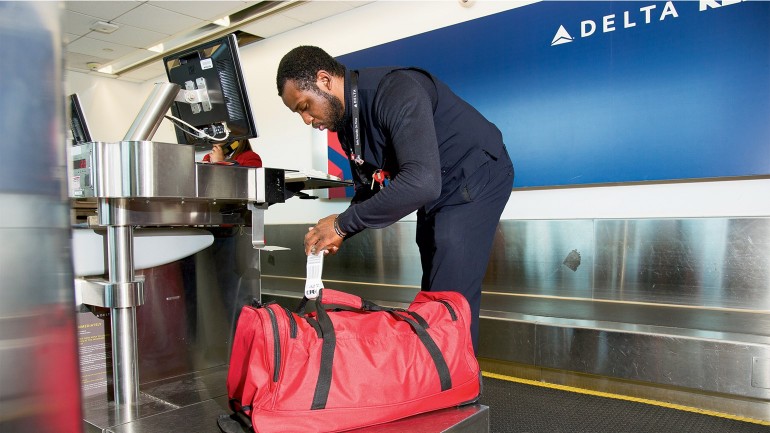Sponsored Listings:
Delta is implementing a new $50 million baggage-handling system based on radio frequency identification (RFID) technology that is expected to reduce the number of the airline’s lost and mishandled bags by 25%.
“They clearly have an intention to improve passenger processing,” said Caroline Camilli-Gay, the baggage program manager with the air transport information technology company SITA, which each year publishes an analysis of mishandled baggage worldwide.
Early this year, Delta began converting from the longtime industry standard — bags tracked via optical bar-code scanners — to a system in which bags are tracked and identified via radio frequencies.
Once the system is fully installed, Delta will be making more extensive use of RFID tracking technology than any airline in the world, according to Camilli-Gay.
The technology itself is not new. McCarran International Airport in Las Vegas, for example, has been using radio frequencies to track all baggage it handles since 2005. And Australia’s Qantas began using RFID bag-gage tracking for frequent fliers within its domestic network in 2010.

Those who have checked bags in Las Vegas in the past decade or on some Delta flights this year might have been unaware of the RFID tracking system, in large part because the bag tags appear similar to those used in the standard barcode system.
What passengers can’t see is that within each RFID tag is a small, embedded chip and a radio antenna.
David Bourgon, manager of airport IT services at McCarran, said that while the industry standard for accuracy when it comes to bar-code scanning of bag tags is just 80% to 95%, the RFID system at the Las Vegas airport is accurate 99.5% of the time.
Unlike many airports, where baggage handling is run by the airlines, at McCarran the airport is responsible for tracking bags as they move from check-in counters to TSA screening and then as they move from screening back to the airlines to be sorted for specific flights.
Bill Lentsch, Delta’s senior vice president of airline operations and customer service, said Delta has thus far achieved 99.9% accuracy where it has deployed RFID tracking, up from the airline’s bar-code accuracy figures of between 85% and 97%.
Bourgon said that radio frequency systems work so well because they merely have to pick up a signal rather than read a tag. Bar-code systems can make mistakes when bag tags are smudged or wrinkled, for example, or when the reader itself is dirty or fogged.
“It’s an antenna,” Bourgon said of RFID. “Dirt doesn’t matter. Clarity doesn’t matter.”
With improved accuracy comes greater efficiency, as the fewer mistakes the tracking system makes, the fewer employees must be deployed to provide manual scanning and backup. As a result, airports and airlines that make use of RFID can add extra checkpoints, which in turn further reduces the chance of a bag being lost or misplaced, Camilli-Gay said. Indications from Delta and others that have used RFID tracking are that it reduces baggage-handling errors by 25%, she said.
Thus far, Lentsch said, Delta is scanning bags using RFID both pre- and post-flight at all 84 domestic airports in which it is adding the system. The carrier is also printing RFID bag tags at each of the 344 airports around the world to which it flies. In 64 airports thus far, Delta has installed belt loaders that give either a green or red light as a bag is being loaded onto a plane.
“Not only are we improving our baggage performance but also improving the passenger experience,” Lentsch wrote in an email to Travel Weekly.
The airline’s move comes both as baggage handling is on the upswing industry-wide and as airlines prepare to comply with an IATA mandate that by 2018 they be able to track each bag, step-by-step, from the checkpoint to its destination.
According to a SITA study, the rate at which airlines mishandled bags in 2015 dropped 10%, to 6.5 bags per 1,000. Last year’s results continued a trend that since 2007 has brought the number of mishandled bags worldwide down from 46.9 million to 23.1 million, even as the number of bags handled by airlines has increased.
The mishandled bag rate among U.S. airlines was just half the worldwide average in 2015, at 3.3 per 1,000 passengers. Camilli-Gay said that is likely a result of this country’s extensive domestic aviation network, which means a greater proportion of travelers fly direct than in other places, thereby reducing the chance of a baggage handling mishap.
In its study, SITA credited technology upgrades for the industrywide baggage handling improvements. Still, Camilli-Gay said that ahead of the 2018 IATA mandate, fewer than half of airlines around the world track whether a bag has been loaded onto its flight, and fewer still track whether the bag has reached its destination.

Delta, along with American, already offers customers an opportunity to track bags on its mobile app. By year’s end, as Delta finishes installing its RFID system, it plans to enhance that feature with push notifications that tell passengers when their bags make it on the plane and also when they can expect them to be delivered to baggage claim.
RFID systems can also have other benefits. Lentsch said that unlike barcoded bags, which employees must search for individually, radio frequency enables workers to take inventory of a full room of bags simultaneously. As a result, they can more quickly reroute baggage when a person misses a flight or has other itinerary disruptions.
Meanwhile, Qantas has initiated a highly automated check-in process by distributing and selling permanent radio frequency bag tags, which are coded with a flier’s information. When the passenger drops off the luggage it is scanned and automatically linked to that person’s flight details.
“They’ve helped us turn our domestic terminals from quite a cluttered environment with long queues at peak times into a calm space that’s a lot easier to navigate,” the airline said in an email.
Sourse: travelweekly.com










